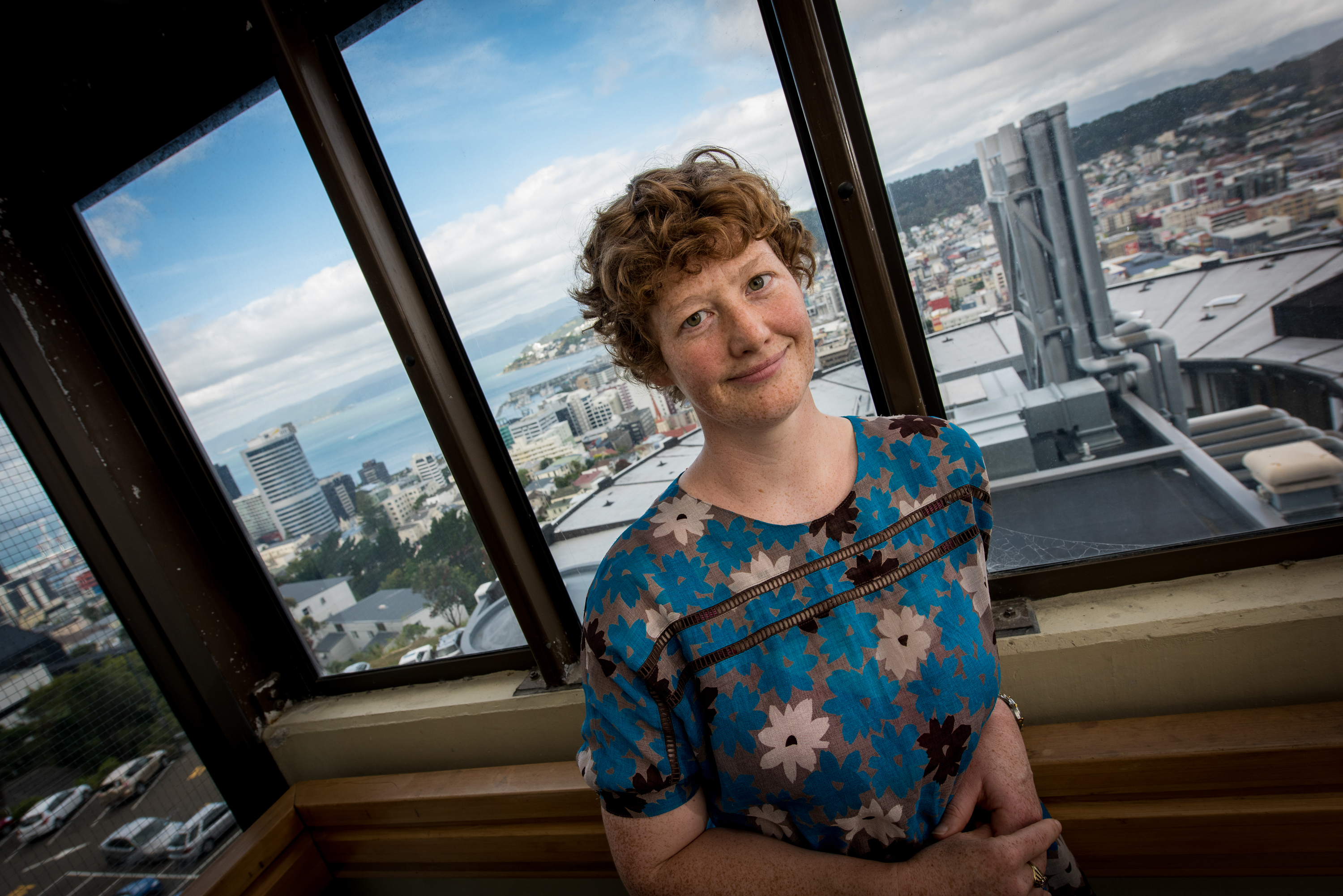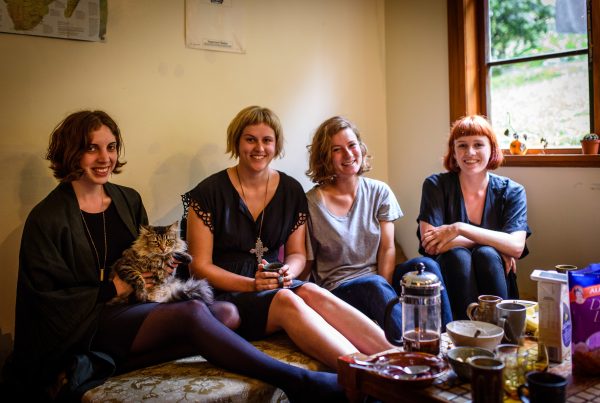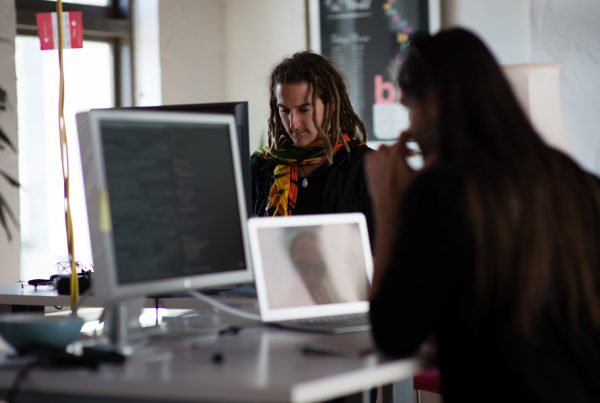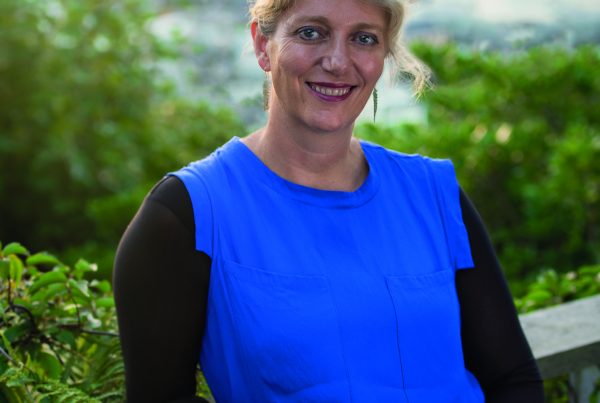This article started with a Facebook post. A few months ago, a photo turned up on a friend’s page. It showed a group of Indian women in saris, apparently whooping with joy and high-fiving, in a control room, flanked by grinning onlookers and serried ranks of computer screens. The caption read, “Hey Hollywood, this is what scientists who have just put an orbiter around Mars really look like”.
It’s a great shot, and I was thinking about it the following day, talking with editor Dan about the next FishHead interview. “Someone in science would be great,” he said. I asked around, and then later that day, listening to the radio on the drive back up the Kapiti Coast, I caught part of an interview with three women scientists, talking, among other things, about the ways in which women are under-represented in the field, and the nuances of why that might be so.
One of the three seemed to me to be the most authoritative, and her name was Nicola Gaston.
Even in the ten minutes or so that I managed to catch (I replayed the full interview later from Radio New Zealand’s website), it was clear that there was a story here. A few days later, I was standing at the doorway of a small, sparse office on the fifth floor of Victoria University’s Laby Building. The intention was to interview Nicola Gaston about her work and her advocacies but, as anyone who’s ever read this magazine knows, I am an appalling interviewer.
As usual, whatever structure there was to my questions soon crumbled, and I now find myself staring at the transcript of an intensely enjoyable but completely free-range conversation, the guts of which I’m now going to try to communicate.
Just so you know, Dr Nicola Gaston is a senior lecturer at the School of Chemical and Physical Sciences at Victoria University, and a principal investigator at the MacDiarmid Institute. She is currently president of the New Zealand Association of Scientists.
My science journey starts at school, I suppose. I was good at it and I had some good teachers. I enjoyed it, but I don’t really have a creation story about how I became a scientist. It’s just a set of decisions I made: I like this, I’m interested and I want to keep learning. So I went to university and I kept at it.
I was born in England, because my parents were living in the UK at the time, but they and my grandparents were all born here. Not that it really matters, but I do think there was something about knowing I had been born somewhere else that was part of this intense desire I had to always be able to travel, and to have a career that would support that. And I knew that science is a career that encourages and supports travel. So I was pragmatic in that way, but I really don’t think I would have seriously considered another career anyway. It’s always been my thing.
We talk here for a while about what is ostensibly the purpose of this story; the reasons why women are under-represented in science, despite the fact that in most disciplines at undergraduate, graduate and doctorate level the sexes are roughly balanced. After completing a doctorate, the usual next step in any scientist’s career is to try to secure funding for their research, but with budgets being limited and more tightly focused every year, and business and industry having a large say in what does and doesn’t get funded, the competition for grants and positions is intense.
A few years ‘missing’ on your CV — to raise children, say — can make all the difference between furthering a career, or being forced to drop out of research-based science. Scientists, particularly women scientists, are so used to this apparent barrier in their progress they even have a name for that great pool of talent whose potential work is being lost; they call it the ‘post-docalypse’.
And, of course, it becomes a self-fulfilling prophecy. Historically, the science we were taught at high school was dominated by a pretty familiar pantheon of old white men (usually with some pretty astounding facial hair), and that stereotype can be pretty indelible. Nicola has run up against these clichés throughout her career.
It’s partly the stories we tell ourselves about science. And even I find myself doing it when I’m teaching. I mean, I teach quantum theory and there are fantastic stories about Max Planck, who at the time was working for an electrical company, literally trying to develop a better light bulb. But out of his testing and theorising about the properties of the materials he was working with, comes the foundations of quantum theory. And it’s a story I love telling, but then there’s always that point when I’m reeling off the names of the figures involved, and it really is just this list of white men.
And that is the historical truth, and it doesn’t diminish the science that was done in any way, but I wonder whether even our newest generation of students are still getting this idea that there is something about science at the highest level that is still a male preserve. I quite deliberately bring out Marie Curie [who practically discovered radiation, was the first person to win two Nobel prizes, and is still the only person to win a Nobel in two different sciences; physics and chemistry], but I do feel that she is overworked as a counterweight to the myth of the lone male genius. The real point is that all science is collaborative, if not in real time, then as a result of teamwork over time — that’s where ‘scientific objectivity’ comes from I think.
It’s a curious thing, and a surprising realisation. I’ve always thought of science as being the most egalitarian of careers, and one in which women would progress on merit as a matter of course. But while we no longer blink at women being at the very top of politics, economics and the arts, the ways in which we fund and encourage science have put up a roadblock to women’s progress that is potentially costing the world very dearly.
And that opens up an even broader issue. Although women are the most visible victims of our recent policies and attitudes towards science, there is maybe even more insidious damage being done to science as a whole.
There’s been a movement right around the world — and we’re certainly buying into it here — to harness science to industry. And at one level, that’s absolutely fine. We all want science to pay its own bills, and to contribute to the economy. But if that business/industry control of funding becomes absolute, then suddenly you have people who don’t really grasp the potential, or the implications of your research, making decisions about whether it goes ahead or not. And that can be incredibly damaging.
I mean, if you had tried to explain to anyone at the time what quantum mechanics was, I don’t know if anyone other than a very good scientist could have grasped it, and certainly the practical applications of quantum mechanics weren’t obvious. But quantum mechanics is now at the heart of all computing, all electronics. It was purely blue-sky, speculative research, but it changed the world in incredible ways.
My fear is that our current funding model — which focuses so tightly on short-term industrial application — is going to ignore and kill off the research that could actually change the world.
On my recording of our talk, I can hear myself gruntling along in excited agreement here. History is littered with examples of purely speculative science that utterly transformed our lives. James Maxwell’s theory of electromagnetic radiation led directly to the invention of radio communication, but it wouldn’t have happened when it did if Maxwell hadn’t had a place to work, and a salary to live on. Any scientist could name you a dozen other examples. Yoking science to industry might yield a breakthrough that makes our pine trees grow a little faster, or our cows udders a little fatter, but it’s probably not going to see society make any giant leaps. For that, you need peer-reviewed science that is free to go off the map and into uncharted, unimaginable territory.
But the issue is even larger than funding. This month there has been outrage, and many fine words spoken, about the absolute importance of freedom of speech as a foundation stone of our society. And yet…
…a bill has just passed through the [US] House of Representatives, which actually removed the right of scientists to give evidence on the subjects of their expertise. A scientist who has spent years on a subject is dismissed as being too biased to comment on it, while a lobbyist for industry is still allowed to participate in the debate.
It took me a while to take this in, but search out ‘EPA Bill HR 1422’ and you’ll soon be up to your spleen in indignation. The bill will be vetoed by President Obama, but it is indicative of what a future Republican administration has planned.
Not that we have any reason to be complacent back here. We regularly see scientists who raise concern about water pollution belittled and undermined, while our media still happily witter on in a hugely condescending way about ‘boffins’ and their ‘gadgets’, while delighting in smirking at the ‘latest scientific theory’ as though it were some passing whim, soon to be superseded.
To a scientist, of course, everything is theory, even when the evidence is utterly overwhelming. That’s why scientists talk about the ‘theory of gravity’, and not just ‘gravity’. This apparent linguistic uncertainty gets ruthlessly exploited by industry and the media, always keen to undermine any science that might question the sustainability of their business. We should probably count ourselves lucky that no fundamentalist — cheered on by Fox News — has yet demanded equal air time for his ‘theory of intelligent falling’.
There’s two things we need to do, I think. We need to open up broader pathways for people to get into science. If we don’t deliberately do that, then the demographic issues we have are going to get perpetuated for another generation. And that can harm science, and also harm our entire society.
But we also need to stop — now — this devaluing of what scientists actually do. There’s an industry and political culture now that talks as though scientists aren’t living in the ‘real world’, when if anything it’s the complete opposite.
And we need to re-establish some of the emphasis on exploratory off-the-map research. Science working closely with business has its place. But if that’s all we’re about, then we’re denying ourselves the possibility of doing something truly great. And we’re better than that.






